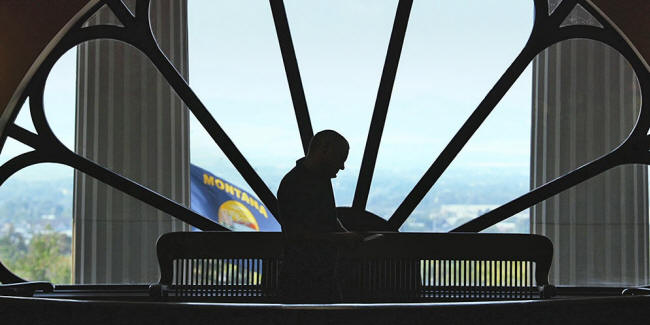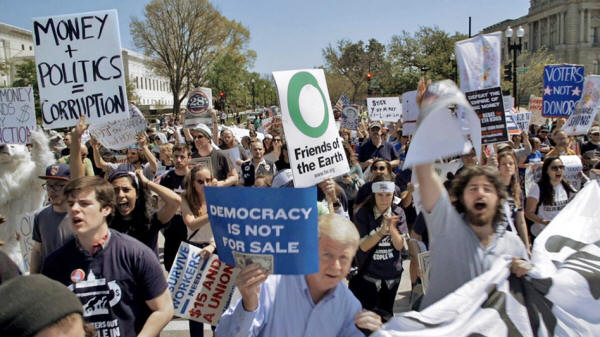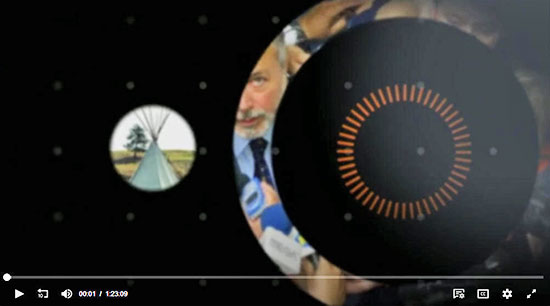|
A still from the documentary of John S. Adams silhouetted
in the Montana Capitol building.
The film, directed by Kimberly Reed, is one of the most expert dissections ever conducted of the subterranean tentacles quietly strangling U.S. democracy.
NOTE: "Dark Money"
was co-funded by Topic Studios, which is part of First Look Media,
along with The Intercept.
This long-term, close-to-the-ground focus is cinematically unique, and makes it possible for "Dark Money" to illuminate three startling facts about how America now works.
Big, out-of-state money therefore can flood into small races in the last weeks before an election with total anonymity, paying for the sleaziest ads and mailers imaginable, produced by organizations created solely for that purpose.
For instance, as the film depicts, three days before the 2008 GOP primary, a group calling itself Mothers Against Child Predators sent out bulk mailings suggesting that John Ward, an incumbent Republican state representative, was a secret admirer of the serial killer John Wayne Gacy, simply because he opposed the death penalty.
Ward then was defeated by
a little-known, more conservative challenger. Mothers Against Child
Predators, having served its purpose, vanished, with Montanans
having no idea who was behind it.
But "Dark Money" is just a chapter in the long story of the corporate right's attempts to empty democracy of any meaning.
It will make more sense
if, before watching it, you take a big step back and consider how we
got here.
protesters against dark money in Washington, D.C.
Any country can have no more than two of them simultaneously:
As Ann Ravel, former chair of the Federal Election Commission (FEC), points out in "Dark Money," Watergate was in some ways a campaign finance scandal.
In 1974, Congress
responded by making sweeping revisions to campaign finance law,
placing strict limits both on contributions to and expenditures by
candidates.
Over the following decades, other suits have stripped away additional chunks of the 1970s reforms, culminating in 2010 with the Citizens United decision.
Citizens United and related rulings made it possible for anyone, including corporations, to spend unlimited amounts supporting a political campaign, on one vague condition:
This project has been an
attempt to mold the U.S. into a country with situations #2 and #3 -
i.e., wealth inequality plus total freedom to spend for the
ultra-wealthy - while getting rid of #1, a functioning democracy.
While the right is correct that anything short of this does in some peculiar sense make corporations and billionaires less "free," it is wrong that that's a bad idea.
Take it from free-market hero Adam Smith, who wrote in "The Wealth of Nations" that,
(Smith was talking about banking
regulations, but the same point applies to campaign finance.)
But that would require getting rid of our glaring wealth inequality. That's certainly not on the table now, but it's a totally normal, mainstream idea - at least if you consider Aristotle, Benjamin Franklin, or John Adams to be normal and mainstream.
As Adams wrote in Philadelphia just before the signing of the Declaration of Independence,
Therefore, Adams said,
While we work on that, however, the best we can do is try to force the government to enforce the weak restrictions on political money that still exist.
That's what "Dark Money"
is about...
of
Montana's State Capitol building at dawn.
Indeed, the Citizens United ruling stated that,
It's simply that the
political system has decided not to do anything about it.
Barack Obama was
urged to do so for years, but never did.
Meanwhile, it used to be the case that nonprofits were at least forced to disclose their big donors to the IRS, even if that information remained secret.
The
Trump Treasury
Department has changed the rules so that the IRS no longer receives
this information.
The bad news can be deduced from archival footage late in "Dark Money" showing Don McGahn, a Republican campaign finance lawyer, during his time as an FEC commissioner from 2008 to 2013.
He was the primary force
behind the GOP strategy of constant FEC deadlock.
If Kavanaugh makes it
there, he'll certainly vote to reverse the recent dark money
decision if given a chance, and much more besides.
You will never see more hopeful examples of how normal people can fight and win skirmishes with big money. You'll also never see more clearly the price they have to pay, and size of the beast they're up against.
And at the end, you'll understand that we're still in the midst of a gargantuan war.
Full Video
For video click above..
Clip
|





